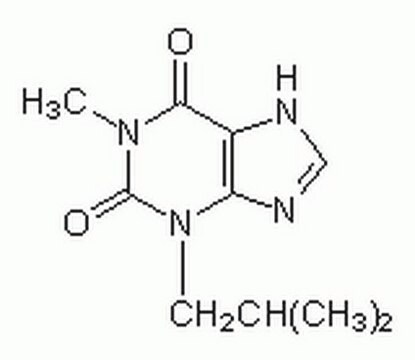Wszystkie zdjęcia(1)
Kluczowe dokumenty
DIF001
3T3-L1 DIFFERENTIATION KIT
Sufficient for 100 mL differentiation medium
Synonim(y):
Zestaw do różnicowania 3T3-L1
Zaloguj sięWyświetlanie cen organizacyjnych i kontraktowych
About This Item
Kod UNSPSC:
12352207
NACRES:
NA.75
Polecane produkty
Formularz
solution
zastosowanie
100 mL differentiation medium
metody
cell culture | mammalian: suitable
Warunki transportu
wet ice
temp. przechowywania
−20°C
Opis ogólny
3T3-L1 cells are derived from mouse 3T3 cells and provide a widely-used fundamental model in the study of adipose physiology and metabolic diseases. They exhibit a fibroblast-like morphology before differentiation but become rounded and accumulate lipid droplets several days after the initiation of differentiation. The accumulated lipid droplets can be visualized by light microscopy. The in vitro differentiated 3T3-L1 adipocytes result in characteristics similar to tissue-derived adipocytes and have been commonly used to study adipogenesis, lipolysis, and metabolic dysfunctions. The 3T3-L1 Differentiation Kit provides enough supplements to make 100 ml of differentiation medium and 600 ml of maintenance medium which is sufficient material for 12 100 mm culture dishes.
Zastosowanie
3T3-L1 DIFFERENTIATION KIT has been used in:
- Differentiation of 3T3-L1 preadipocytes to adipocytes.
- Study of obesity, adipogenesis, lipolysis and lipid metabolism
- Differentiation of 3T3-L1 preadipocytes to adipocytes
- Study of obesity, adipogenesis, lipolysis and lipid metabolism.
Uwaga dotycząca przygotowania
Insulina (1,5 mg/ml) 0,6 ml (numer katalogowy DIF001A, zielona nakrętka)
Koktajl różnicujący, 1000x (liofilizowany) 1 ml (numer katalogowy DIF001B, żółta nakrętka)
DMSO (bezwodny) 0,5 ml (numer katalogowy DIF001C, niebieska nakrętka)
Koktajl różnicujący, 1000x (liofilizowany) 1 ml (numer katalogowy DIF001B, żółta nakrętka)
DMSO (bezwodny) 0,5 ml (numer katalogowy DIF001C, niebieska nakrętka)
Przechowywanie i stabilność
Store the kit at −20 °C, protected from light.
Ta strona może zawierać tekst przetłumaczony maszynowo.
Hasło ostrzegawcze
Danger
Zwroty wskazujące rodzaj zagrożenia
Zwroty wskazujące środki ostrożności
Klasyfikacja zagrożeń
Repr. 1B
Kod klasy składowania
6.1C - Combustible acute toxic Cat.3 / toxic compounds or compounds which causing chronic effects
Wybierz jedną z najnowszych wersji:
Certyfikaty analizy (CoA)
Lot/Batch Number
Nie widzisz odpowiedniej wersji?
Jeśli potrzebujesz konkretnej wersji, możesz wyszukać konkretny certyfikat według numeru partii lub serii.
Masz już ten produkt?
Dokumenty związane z niedawno zakupionymi produktami zostały zamieszczone w Bibliotece dokumentów.
Fuu-Jen Tsai et al.
Frontiers in pharmacology, 9, 1004-1004 (2018-09-21)
Antiretroviral (ART) drugs has previously been associated with lipodystrophic syndrome, metabolic consequences, and neuropsychiatric complications. ART drugs include three main classes of protease inhibitors (PIs), nucleoside analog reverse transcriptase inhibitors (NRTIs), and non-nucleoside reverse transcriptase inhibitors (NNRTIs). Our previous work
Jérémie Gautheron et al.
Nature communications, 7, 11869-11869 (2016-06-22)
Receptor-interacting protein kinase 3 (RIPK3) mediates necroptosis, a form of programmed cell death that promotes inflammation in various pathological conditions, suggesting that it might be a privileged pharmacological target. However, its function in glucose homeostasis and obesity has been unknown.
Nasz zespół naukowców ma doświadczenie we wszystkich obszarach badań, w tym w naukach przyrodniczych, materiałoznawstwie, syntezie chemicznej, chromatografii, analityce i wielu innych dziedzinach.
Skontaktuj się z zespołem ds. pomocy technicznej







